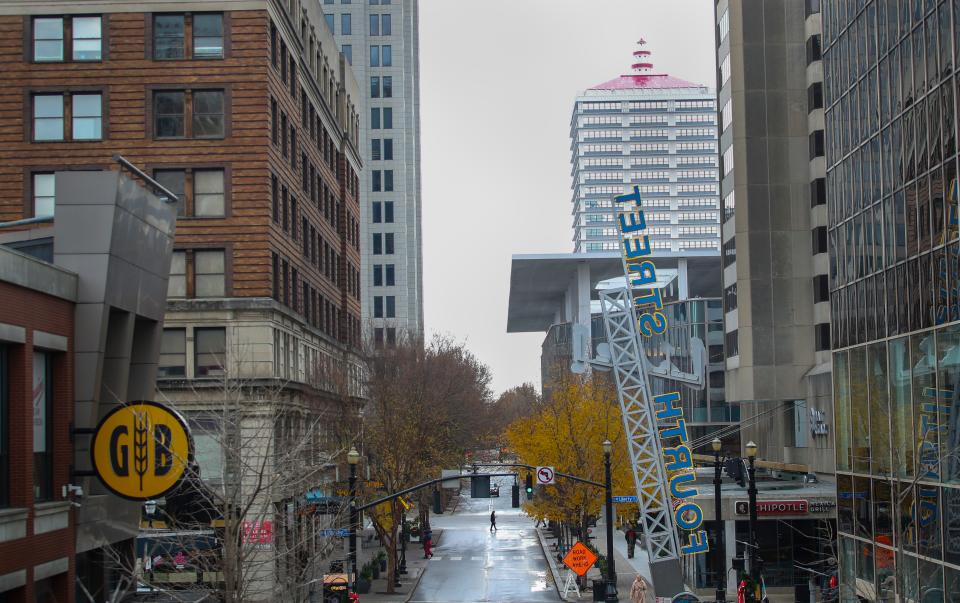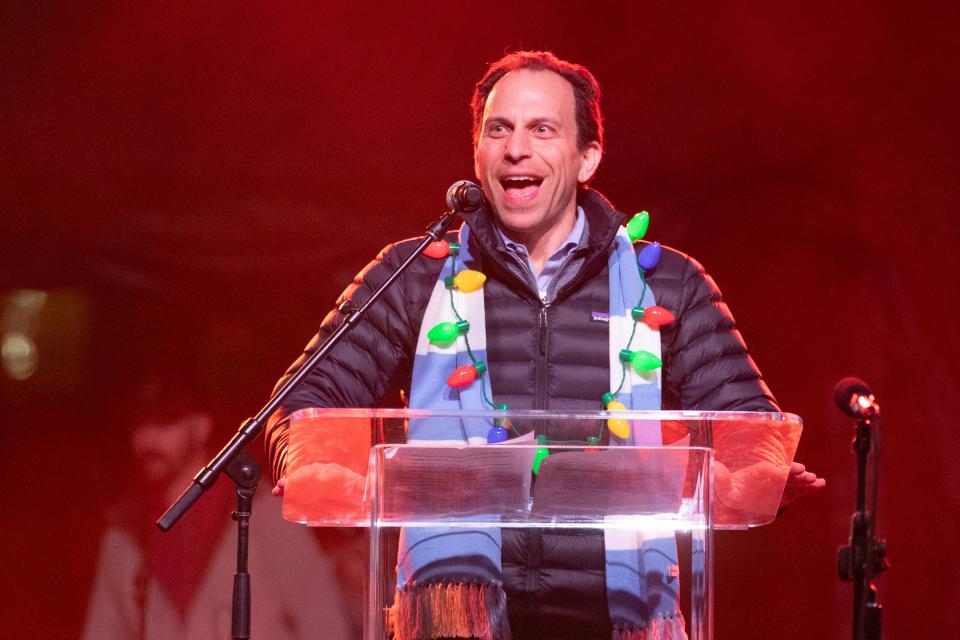Louisville unveils its new economic development strategy. What to expect in 2024
- Oops!Something went wrong.Please try again later.
Louisville Metro Government unveiled the final version of its master plan Wednesday intended to guide economic development in the city.
"This plan, and the work to create the economy of our future, takes every one of us," said Louisville Mayor Craig Greenberg.
The mayor convened a group of about 80 stakeholders in August for a series of meetings through the summer and fall to develop the document, which outlines more than 100 recommendations for improving the lives of current residents while elevating Louisville's profile to attract newcomers.

The stakeholder group included leaders from government, nonprofits, religious and educational institutions, private businesses, and labor organizations.
The finalized strategy comes after the city shared a substantial draft in mid-November. Additional stakeholder and public input was considered and incorporated into the final report, titled "Growing Louisville Together."
"We want a city that's on the front pages of the Wall Street Journal and The New York Times highlighting that Louisville is a place where young people are moving, businesses are growing and thriving and universities are recognized as best in class," Greenberg said Wednesday.
Here's some of what's new in the 92-page finalized strategic report:
Creating a fund for commercial property acquisition to aid those in historically disinvested neighborhoods in purchasing commercial properties.
Conducting a comprehensive needs assessment for public transportation, followed by creation of a strategic plan.
Incentivizing the creation of permanent supportive housing options in private developments.
Replicating a program that helps immigrant small business owners grow their business for female entrepreneurs, particularly Black and Latina women.
Partnering with higher education institutions to establish a "hospitality institute," promoting green industries and green jobs, and promoting apprenticeship programs offered by building trades unions.
Connecting Lynn Family Stadium to other downtown sports venues via a pedestrian-friendly “sports corridor."
Advocating for full state funding for the proposed expansion and renovation of the Kentucky Fair and Exposition Center.
The city spent $150,000 to create the plan, hiring Indiana-based economic development firm Ginovus and consulting and management firm TPMA.
Several ideas in the report were previewed in the mayor’s legislative agenda he revealed in October, ahead of the upcoming Kentucky General Assembly session that begins in January.
The report’s recommendations are split into four main themes. The largest of these areas is “quality of place” and centers on quality-of-live initiatives to increase Louisville's desirability and improve Louisville's physical landscape.

Other central themes of the report include investing in people through education and skills, increasing access to capital and fostering entrepreneurial development, and better telling Louisville’s story to retain and attract talent.
Major proposals and goals previously highlighted in the November draft report include:
Establishing pre-K programs for all 3- and 4-year-olds in Louisville by 2033
Spending $100 million over the next 10 years to redesign downtown streetscapes
Creating at least 300 Black-owned businesses by 2027
Doubling the city’s growth rate, leading to 1 million residents by 2038
Fully staff the Louisville Metro Police Department by 2027. No specific staffing level is mentioned in the report.
Transforming the Belvedere into a “world-class public space.”
Cutting permitting and zoning timelines by at least 25%.
What's next?
One of the major recommendations of the report is the creation of a public-private organization tasked with guiding economic development in the city.
With a $6 million annual budget and membership of about 30 community stakeholders, this group will track progress and help advance the plan's many suggested action steps and ideas.
Greenberg said Wednesday his administration is already at work to establish this group, which he wants to be activated by July 1.
In the short term, Deputy Mayor Pat Mulloy is taking the lead on furthering the plan, which includes developing key players on various initiatives, timelines, and budgetary needs. Greenberg also said the public will be able to track progress via a public-facing online dashboard maintained by his administration.
Growth & development reporter Matthew Glowicki can be reached at mglowicki@courier-journal.com, 502-582-4000 or on Twitter @mattglo.
This article originally appeared on Louisville Courier Journal: Louisville unveils economic development strategy. What to expect in 2024

